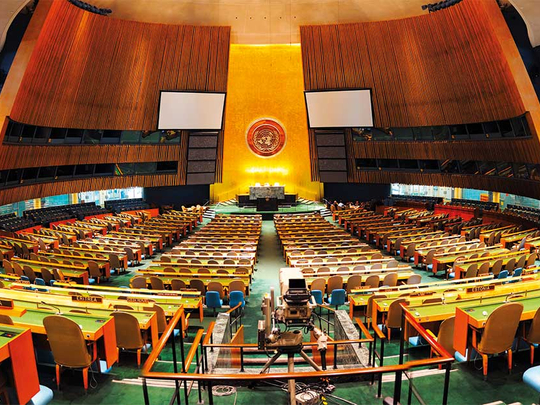
United Nations: With rising unilateralism challenging its very existence, the United Nations convenes its annual meeting of world leaders Monday and will try once more to tackle problems together as a community of nations.
This year, 133 world leaders have signed up to attend the General Assembly session, a significant increase from last year’s 114 and one of the highest in recent times. UN Secretary-General Antonio Guterres called the expected large turnout “eloquent proof of the confidence of the international community in the United Nations,” though other UN officials and diplomats said it’s in response to growing concerns about an increasingly turbulent world.
Guterres said last week that one of his overriding concerns in an increasingly globalised world is the threat to having the UN’s 193 member nations work together, which is the foundation of the United Nations.
“Multilateralism is under attack from many different directions precisely when we need it most,” the UN chief said. “In different areas and for different reasons, the trust of people in their political establishments, the trust of states among each other, the trust of many people in international organisations has been eroded and ... multilateralism has been in the fire.”
Guterres challenged diplomats at last week’s opening of the 73rd session of the General Assembly by saying: “At a time of fragmentation and polarisation, the world needs this assembly to show the value of international cooperation.”
But whether it will be able to remains in question.
At this year’s gathering of presidents, prime ministers, monarchs and minsters, populist leaders will include US President Donald Trump, President Andrzej Duda of Poland and Premier Giuseppe Conte of Italy along with the foreign ministers of Hungary and Austria.
US Ambassador Nikki Haley told reporters that Trump, who champions an “America First” policy, wants to talk about “protecting US sovereignty,” and she reiterated Washington’s opposition to the 2015 Paris climate agreement on curbing global warming and a newly agreed international compact aimed at regulating migration.
“We really value sovereignty of the country,” Haley said. “It is not saying multilateralism can’t work, but it’s saying sovereignty is a priority over all of that, and we always have to make sure we’re doing that — and there are many countries that agree with us.”
Before stepping down as UN humanitarian chief on August 31, Zeid Ra’ad Al Hussain expressed serious concern that populism, intolerance and oppression are “becoming fashionable again.”
“It all builds, because once you start down the path of intolerance, it’s very difficult to stop it, unless at the end of the day you have conflict,” he said.
French President Emmanuel Macron is expected to be a key voice joining Guterres in the coming week in speaking out against this trend and supporting multilateralism as key to promoting peace.












